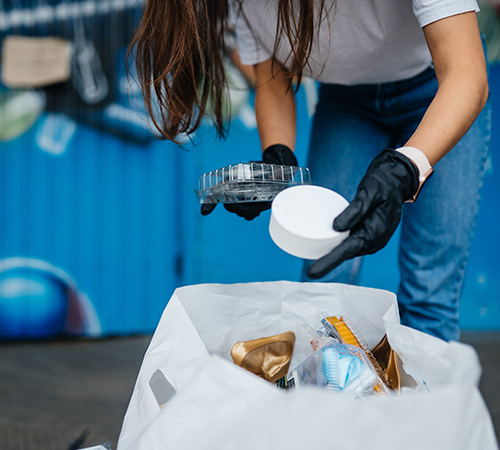Have you ever stopped to consider the waste generated by your business? You might be astounded at the volume and types of waste. Perhaps even more compelling: You might be amazed at how much of your profits are going down the drain or hauled away with your waste.
Being a waste-conscious business is good for business. Why? For one thing, it’s the financially sound way to conduct your business. When you build an ethos around reducing waste, you can save on everything from costly waste hauling and disposal (especially organic waste, which is the heaviest) to purchasing single-use packaging and supplies.
Just as important, it’s the responsible thing to do for the environment. By introducing waste-prevention practices, you’ll conserve natural resources, energy, and landfill space.
And one more thing that can’t hurt: It’s good for your reputation. Consumers increasingly favor buying from companies that have established environmentally friendly business practices.
Thinking Long Term: What an Overhaul of Your Waste Practices Might Look Like
Let’s face it: Redesigning your waste practices doesn’t happen overnight. Take these steps to develop and implement a long-range strategy.
- Start with an audit. Examine every one of your waste streams and identify where they come from, which processes generate waste, and where and how the various types of waste are discarded. Evaluate everything from office waste to process, hazardous, nonhazardous, and solid waste. Look at what is being thrown away or poured down the drain.
- Determine waste prevention actions. Look hard at where you can increase efficiencies and processes to prevent waste. Consider bringing in an outside resource or calling on state or local agencies to help with your assessment and to assist in developing waste-reduction strategies and practices.
- Set goals and make a plan for attaining them. Just as you would set KPIs and plan for other business initiatives, do the same with the waste prevention opportunities you have identified.
- Promote the initiative—in both internal- and external-facing channels. In addition to challenging employees, many businesses have successfully incentivized customers to join them in their waste-prevention efforts.
- Measure and share the results. If you build in ways to measure your efforts, you’ll know what’s working and what’s not. And just as you’ve promoted your new waste-reduction ways internally and externally, ensure you share your successes with employees and customers.
In The Short Term: Small Changes You Can Make Today
No matter the size of your business, there are small changes you can implement almost immediately to begin to alter the waste culture. Here are just a few ways you can start right away.
- Change the defaults on your printers to print on both sides.
- Print only what you need to have paper copies of, and instead, use digital files and programs for both documents and sticky notes.
- Purchase recycled toner cartridges.
- Adjust your marketing plan to market digitally rather than using mail or print.
- Buy items—from office supplies to snacks—in bulk to reduce packaging.
- Eliminate single-use plastics from your break rooms and at events.
- When you buy goods, look for those made with recycled products.
- Compost organic waste.
- Donate leftover or extra food from company-sponsored meals or events.
- Install reusable furnace and air conditioner filters.
The bottom line? Figuring out how to prevent and reduce waste is a strategy that can only boost your business long-term, and you’ll be doing your part for the planet when you make your business an environmentally conscious one. Contact Us with any questions or to schedule an audit to see how we can assist you in your recycling program.
